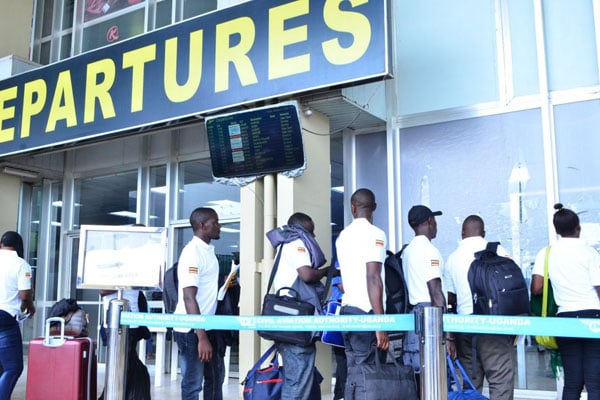Stay here and create jobs, govt urges Ugandans

Sights of youth leaving the country for casual jobs abroad have become common amid increasing levels of unemployment. Photo | File
What you need to know:
- The 2024 Afrobarometer report findings published by the Monitor on Friday indicated that more than four in 10 respondents (42 percent) have considered leaving Uganda.
Finance Minister Matia Kasaija has urged Ugandans to consider exploring more trade and investment opportunities in the country instead of thinking of going abroad to look for jobs.
Responding to the Monitor’s Friday story, which indicated that more Ugandans prefer to move abroad for jobs, Mr Kasaija said there is no better country in Uganda than Uganda and that the government is working to create more employment opportunities.
“I have read an article that many Ugandans want to go abroad, to go away from a country with this conducive weather and then you go and freeze in foreign countries in winter? I would not do that; this is the best country I have seen in the whole world; there is no part of the world I have not gone to,” he added.
The 2024 Afrobarometer report findings published by the Monitor on Friday indicated that more than four in 10 respondents (42 percent) have considered leaving Uganda.
This figure is highest among the most educated (59 percent of those with post-secondary education and the youth of 51 percent of 18- to 35-year-olds.
But Mr Kasaija said the sitting government is working “day and night” to create more jobs.
“We are working to ensure that, first of all, this country is stable; no wars. We work hard day and night to look for business; we have invited investors to come and create opportunities and jobs and you will see how the economy will move,” he said.
“All the remaining things will be worked on; we are serious people; we have seen this country rise; you people forget that we picked this country from mad; there was nothing here; you couldn’t get soap, salt, or even toilet paper. People used paw paw leaves to wash. So let’s be patient, if you have ideas, bring them to us and we talk,” he added.
The minister was speaking during a tour of the Roofings Rolling Mills plant, which makes iron sheets and other materials, in Namanve Industrial Park on Friday.
Mr Kasaija was accompanied by State Minister for Investment and Privatisation Evelyn Anite.
Ms Anite told journalists that they were at the factory to listen to the company’s challenges, which include high power tariffs and a poor access road.
“Roofing was complaining about the high power tariffs and wanted us to come and see the consumption. The President directed that large industrialists should be given power at 5 cents per unit and we were here to assess that issue and follow it up,” she said.
“I am happy that the Ministry of Energy representative was here with us and he has been able to assess that issue. The industrialists have been getting the 5 cents of power at off-peak hours (12am to 6am) but the intention is for them to get it all day long,” she said.
“The other issue is that they are concerned that the road project in the park is not going fast enough and we have assessed the project; the contractor, Lagan Dott, is working to complete it, it has been delayed by the railway line, so we will also follow up on the funds for the project to ensure it is completed,” Ms Anite added.
Mr Kasaija added: “There is a law that has inconvenienced them [Roofings] but this law is for East Africa and we are going to sort it out but I am not going to give you details about the law but I have promised them that we are going to look into it.”
Dr Sikander Lalani, the chairman of Roofings Group, said they have invested more than $500m in the new plant at Namanve.
“We employ about 1,700 employees, the majority of whom are Ugandans. Our main export is Tanzania, then DRC, Burundi, Rwanda and South Sudan. And recently we have started exporting to Kenya, mainly because our products are of high quality,” he added.
Mr Lalani explained that the new production line to be launched in November, which will produce 13,000 tonnes of roofing sheets per month. This will bring their total production capacity to 25,000 tonnes of roofing sheets alone per month.
Mr Kasaija hailed Roofings for setting up the factory that is employing many Ugandans. “The jobs are coming. We are working and slowly we shall get there; if we had 100 Lalanis, how many jobs would we create?” he wondered.




